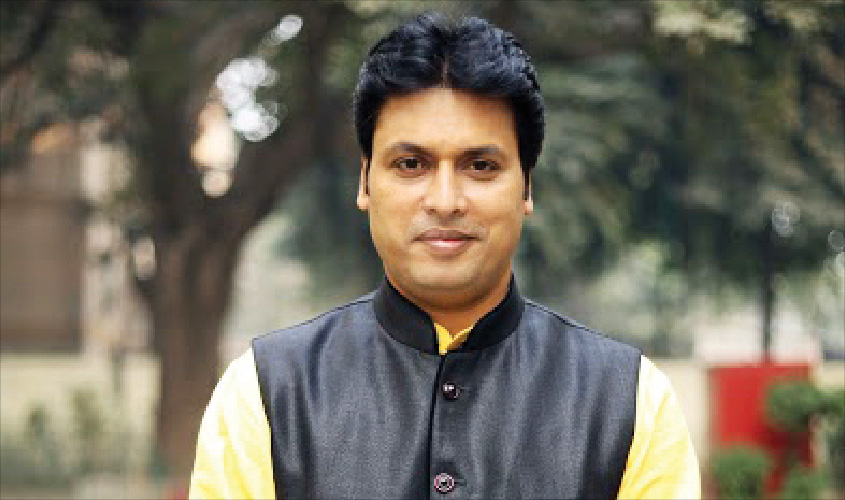At 46, Tripura Chief Minister Biplab Kumar Deb is young by the standards of Indian politicians—and looks younger and fitter than most men in their mid-40s. Thanks to the years of workout at the gym. But it was his association with the Rashtriya Swayamsevak Sangh that afforded him heft and gravitas in politics. Mentored by former RSS stalwart K.N. Govindacharya and trained under Sunil Deodhar, the BJP’s prabhari for Tripura, Deb ascended enough in the esteem of the top party leadership to be appointed as Chief Minister. A month in office after a spectacular victory of the Bharatiya Janata Party over the entrenched Left Front in the north-eastern state, Deb is raring to go.
Speaking to this correspondent in Agartala, the Tripura Chief Minister said, “From one month’s experience, I can claim that we can do a lot. The previous government did nothing for the state.” He is not off the mark. A regime wallowing in the poverty of its Chief Minister and refusing to revise, let alone discard, its discredited ideology, became the byword of stagnation.
Deb tells awful stories about the communist rule of a quarter of a century; and if they are anything to go by, it was the closest that an Indian state got to George Orwell’s 1984. Quite apart from the celebration of poverty and disdain for economic development (which the Reds regarded as a capitalist disease), there was control over society. “You needed permission to get married from the local CPM chap. How you named your child should also get their consent,” the new Tripura Chief Minister says.
This would sound improbable, primarily because of the image that communists and their fellow-travellers have cultivated for themselves; but this is very much possible; in fact, it has happened in the past in our country. In her memoirs All These Years, Raj Thapar, wife of the top VIP revolutionary Romesh Thapar of yesteryears and sister-in-law of the prominent Left historian Romila Thapar, mentioned an interesting anecdote: “Sitting with Mohan [Kumaramangalam, an important communist leader] once, having a cup of tea, he asked me what I had named my daughter. When I said ‘Malavika,’ he rolled those marble black eyes of his and said, ‘You better be careful, Raj, that’s a reactionary name and like this you might slowly find yourself on the other side of the fence.’ I was aghast and controverted with him, passionately explaining how I had kept this name locked securely in my consciousness ever since I read Kalidas’ Malavika Agnimitra in college.” The name “Malavika” was too Hindu—which in the communists’ scheme of things means communal—to be approved by the commissar.
If somebody as aristocratic as Raj Thapar could be chided in a metropolitan city, one could imagine the plight of lesser mortals in a remote part of the country. “Every possible coercive and peremptory method was applied by the Commies to attain their objectives,” Deb says. He gives an example: if the son of a state government servant was inclined towards the BJP, the father would be threatened transfer, thus forcing the youngster to steer clear of the saffron party.
The Reds perpetuated their regime by precluding the emergence of an alternative for very long. But once the electorate saw a viable alternative in the BJP, they voted enthusiastically for the saffron party, catapulting Deb to the top office.
In charge of seven departments—Home, Public Works Department, Industries & Commerce (minus information technology), Urban Development, General Administration, Labour, and Information & Cultural Affairs—his government has taken a slew of decisions in the first month. The decisions are a mix of the praiseworthy, the pragmatic, and the political.
The state Cabinet has decided to constitute the Tripura Infrastructure & Investment Fund Board as a salutary entity through an Act to mobilise non-Budgetary resources for important infrastructure and other projects. The idea is to galvanise development with maximum involvement of the private sector—hence the emphasis on “non-Budgetary resources”—so that the young and the talented do not move out of the state. “Over two lakh people have gone out. They tell stories about progress elsewhere; they send pictures of other places. I feel a lot of responsibility to make things better in Tripura,” the new Chief Minister says.
In a bid to augment state capacity, the new Tripura Cabinet has set up a police crime branch with professional, specialised, and well-equipped officers. In another move, the state government has constituted a committee for the implementation of the Seventh Pay Commission; at present, the salaries are governed by the Fourth Pay Commission.
Decisions have also been taken to streamline the recruitment process and formulate a fair, automatic transfer policy. “Within one to one-and-a-half month, the transfer policy will be in place. Experts and stakeholders are being consulted,” Deb says.
Political decisions have also been taken. For instance, the state Cabinet has recommended the renaming of the Agartala Airport as the Maharaja Bir Bikram Manikya Kishore Airport to honour “the visionary Maharaja of Tripura till May 1947,” Deb says.
Then there are measures that are both laudable and political, like replacing Left-inspired textbooks with the NCERT ones. “Their books focused on Marx, Mao, and communist history rather than Gandhi and freedom struggle,” Deb says.
It is too early for the endeavours of the new state government to show result on the ground. But the new Chief Minister hopes that change would soon be visible. A lot, however, would depend on what his administration lays greater emphasis on—solid, development-oriented measures or political, tokenist steps.
Disclaimer: The author was part of a media team visiting Tripura. The trip was sponsored by the state government.

